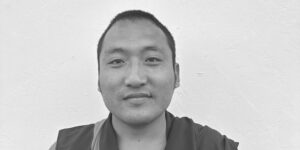
Jamyang was born in Lithang, a region of eastern Tibet called Kham, in 1988. He became a monk at age of seven, and when he was twelve, he came to India for monastic study where he joined Drepung Gomang Monastery in Mundgod. In 2016, he finished his 16 years of Buddhist philosophical studies. In 2017, he taught science, Tibetan, and dialectics at Drepung Gomang Monastic School for grades 1 through 5. From 2018, he began the process of the six-year Geluk examination, finishing in 2023. He completed his Geshe Lharampa degree in February 2024 with the final debate examinations. His first encounter with the study of science was in 2012 when the organization Science Meets Dharma convened a month-long science intensive for monastic scholars. From 2014 to 2019, he participated in the Emory Tibetan Science Initiative (ETSI) summer workshop comprising one month annually studying physics, biology and neuroscience advancing to greater complexity each year. From 2020 to 2023, he participated in the ETSI Sustainability Phase Program which teaches the monastic scholar group a summer pedagogical training intensive and winter research methodology training for one month each session in order to train in teaching science and conducting scientific studies. He has served a a field team researcher for the Tukdam Study from 2020 to present.
Education
Geshe Lharampa degree, 2024, Drepung Gomang Monastic College, Drepung Monastic University
Links
Related Studies
The Field Study of Long-term Meditation Practitioners and the Tukdam Post-death Meditative State
A global community of field researchers are collaborating on a study of an ancient monastic post-mortem meditative state known as tukdam, practiced by present-day expert Tibetan Buddhists and how such a practice might offer insight into mental, spiritual, and physical well-being during the death process, both for the dying and for their support community.


